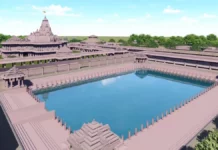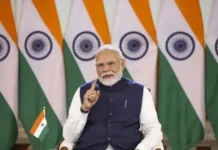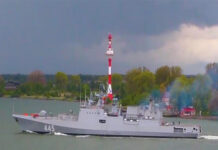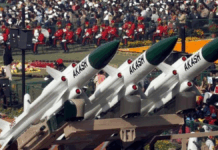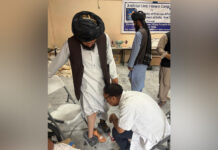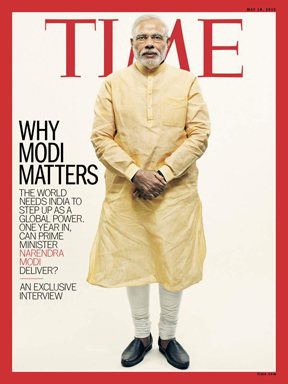 TIME’s new cover this week features a rare and exclusive interview with Indian Prime Minister Narendra Modi. TIME Editor Nancy Gibbs, Asia Editor Zoher Abdoolcarim and South Asia Bureau Chief Nikhil Kumar sat down with the leader of the world’s largest democracy at the Prime Minister’s official residence in New Delhi for his first and only extended interview since becoming Prime Minister one year ago. Modi talked to TIME about everything from his ambitions for India to the global war on terrorism, India’s relationship with the U.S. and China, what personally moves him and more.
TIME’s new cover this week features a rare and exclusive interview with Indian Prime Minister Narendra Modi. TIME Editor Nancy Gibbs, Asia Editor Zoher Abdoolcarim and South Asia Bureau Chief Nikhil Kumar sat down with the leader of the world’s largest democracy at the Prime Minister’s official residence in New Delhi for his first and only extended interview since becoming Prime Minister one year ago. Modi talked to TIME about everything from his ambitions for India to the global war on terrorism, India’s relationship with the U.S. and China, what personally moves him and more.
Highlights from TIME’s exclusive interview with Narendra Modi:
On how he sees the U.S.: “We are natural allies…. What India can do for the U.S., what the U.S. can do for India, I think that is a rather limited point of view to take. I think the way we should look at it is what India and the U.S. can together do for the world.”
On India’s sometimes tense relations with China: “For nearly three decades there has been, by and large, peace and tranquility on the India-China border. Not a single bullet has been fired for over a quarter-century. Both countries are showing great maturity and a commitment to economic cooperation…. We cooperate with China at the international stage, but we compete with China when it comes to commerce and trade.”
On India’s religious diversity, which some citizens believe is under siege: “So far as the government is concerned, there is only one holy book, which is the constitution of India. The unity and the integrity of the country are the topmost priorities. All religions and all communities have the same rights, and it is my responsibility to ensure their complete and total protection. My government will not tolerate or accept any discrimination based on caste, creed and religion.”
On tackling the threat of terrorism: “We should not look at terrorism from the nameplates—which group they belong to, what is their geographical location, who are the victims. These individual groups or names will keep changing. Today you are looking at the Taliban or ISIS; tomorrow you might be looking at another name. We should pass the U.N.’s Comprehensive Convention on International Terrorism. At least it will clearly establish whom you view as a terrorist and whom you don’t. We need to delink terrorism from religion—to isolate terrorists who use this interchange of arguments between terrorism and religion….We should see it as something that is a fight for human values.”
On Afghanistan, Modi says that India will “do whatever is required to be done for Afghanistan’s development.”
On the possibility of the Taliban’s return to power: “In the interest of a stable government in Afghanistan, it would be important to hold consultations with the Afghan government to understand their security needs as the U.S. troops draw down.”
On whether economic reforms have gone far and fast enough: “My government’s coming to power should be viewed in the context of the developments of the 10 years of the last government vs. 10 months of my government. The whole world is again excited and enthusiastic about India and the opportunities that India represents. Whether it is the IMF, the World Bank, Moody’s or other credit agencies, they are all saying in one voice that India has a great economic future.”
On what influences him: “This touches my deepest core. I was born in a very poor family. I used to sell tea in a railway coach as a child…. I have seen poverty very closely. I have lived in poverty. As a child, my entire childhood was steeped in poverty. For me, poverty, in a way, was the first inspiration of my life. I decided that I would not live for myself but would live for others.”
http://time.com/3849492/narendra-modi-interview/
Nikhil Kumar writes in the cover story: “As he nears his one-year anniversary in office on May 26, 2015, Modi has established himself as nothing less than a global political star…. Modi is different, an outsider with humble roots far removed from New Delhi’s political elite, whose father ran a tea stall to support his family…. Modi’s campaign focused on what he had achieved in Gujarat and promised more of the same for India—better infrastructure and less red tape holding back industry…. Modi’s government has also taken steps to further liberalize India’s economy… [and Modi] has tried to make the country’s notoriously sluggish bureaucracy more efficient, implementing an online system to track when bureaucrats actually arrive at work…. But at the same time, questions are growing about whether the scope of Modi’s reforms matches his rhetoric…. The world has been excited about India and its perennially untapped potential in the past, before turning away in disappointment when the performance falls short of the hype. As Modi enters his second year in office, hundreds of millions of his fellow Indians are hoping that doesn’t happen again.”
http://time.com/3849494/narendra-modi-india/
Nancy Gibbs writes in her editor’s letter: “Barack Obama may be the leader of the world’s most powerful democracy, but not its largest one; that distinction belongs to Indian Prime Minister Narendra Modi…. When I met with him earlier this month… [He] was at the center of a whirlwind, with an ambitious reform program at home, 16 trips abroad with China up next, a new al-Qaeda threat against him, and economists challenging whether he would be able to drive India to the 8% GDP growth projected for the coming fiscal year. We discussed these topics and more over the course of two hours, in the only extended interview he has given as Prime Minister…. The U.S. and India are more than just the world’s two biggest democracies. They are diverse, multiethnic and multicultural democracies, and at a moment when many nations are debating how to balance national identity with ethnic diversity, India continues to provide a bracing example.”
India Post News Service

